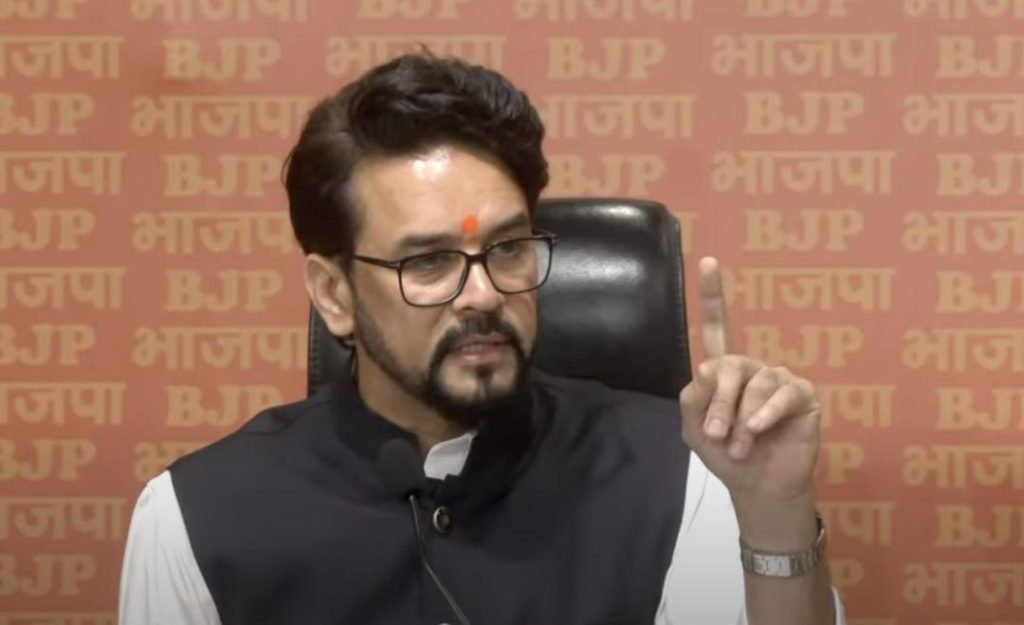
Congress & CPI made Bhimrao Ambedkar lose the poll in 1952: BJP
In a recent statement, BJP MP Anurag Thakur accused the Congress party of laying the foundation of electoral corruption in the very first election of 1952. According to Thakur, the Congress party, along with the Communist Party of India (CPI), joined forces to defeat Dr. Bhimrao Ambedkar, the renowned Dalit leader and architect of the Indian Constitution, in the election.
Thakur’s remarks were made during a recent speech, where he highlighted the irony of the situation. “Congress and CPI together defeated Dr. Bhimrao Ambedkar, a constitution maker and a saint-like leader, in the election,” he said. “74,333 votes were rejected,” he added, emphasizing the magnitude of the electoral irregularities.
The BJP MP’s statement has sparked a heated debate about the role of the Congress party in India’s electoral history. Many political analysts and historians have corroborated Thakur’s claims, pointing out that the 1952 election was marred by widespread rigging, booth capturing, and voter intimidation.
Dr. Bhimrao Ambedkar, a stalwart of the Indian independence movement, was a key figure in the drafting of the Indian Constitution. He was also a champion of Dalit rights and a vocal advocate for social justice. Despite his immense contributions to the country, Ambedkar’s electoral fortunes were beset by controversy and irregularities.
The 1952 election, which was held just a year after India gained independence, was a landmark event in the country’s electoral history. The election saw the Congress party, led by Jawaharlal Nehru, contesting against the CPI, which was led by Ajoy Ghosh. Ambedkar, who was running as an independent candidate, was pitted against the Congress party’s strong candidate, Jagjivan Ram.
Thakur’s allegations have reignited the debate about the role of the Congress party in Ambedkar’s electoral defeat. Many political observers have pointed out that the Congress party, which was in power at the time, used its immense resources and machinery to tilt the scales in favor of its candidate.
The CPI, which was a key opposition party at the time, also played a significant role in Ambedkar’s defeat. The party’s ideologues, who were deeply suspicious of Ambedkar’s progressive views on social justice, saw him as a threat to their own electoral ambitions.
Ambedkar’s defeat in the 1952 election was a significant setback for the Dalit movement, which had been gaining momentum in the years leading up to the election. The defeat was seen as a blow to Ambedkar’s reputation and a setback for the Dalit community as a whole.
In the years that followed, Ambedkar’s health began to decline, and he eventually passed away in 1956. His death marked the end of an era for the Dalit movement, and his legacy was gradually forgotten in the years that followed.
However, in recent years, there has been a renewed interest in Ambedkar’s life and legacy. The BJP government, which has been in power since 2014, has been actively promoting Ambedkar’s legacy and recognizing his contributions to Indian society.
Thakur’s statement has been seen as a significant development in this regard, as it highlights the Congress party’s role in Ambedkar’s electoral defeat and seeks to revive the Dalit leader’s legacy. The statement has also sparked a heated debate about the role of the Congress party in Indian politics and its impact on the country’s electoral history.
In conclusion, Thakur’s statement has brought to light the dark underbelly of India’s electoral history and the role of the Congress party in Ambedkar’s electoral defeat. The statement has sparked a heated debate about the legacy of Ambedkar and the Congress party’s role in Indian politics.
As we reflect on the events of 1952, it is clear that the Congress party’s actions had far-reaching consequences for India’s electoral history. The party’s manipulation of the electoral process and its role in Ambedkar’s defeat set a dangerous precedent for the country’s electoral system.
It is time for the Congress party to take responsibility for its actions and to acknowledge the harm it caused to Ambedkar and the Dalit community. It is also time for the BJP government to continue promoting Ambedkar’s legacy and to recognize his contributions to Indian society.
Ultimately, Thakur’s statement serves as a reminder of the importance of upholding the principles of democracy and ensuring that the electoral process is free and fair. It is our collective responsibility to ensure that the mistakes of the past are not repeated and that the legacy of Ambedkar is preserved for future generations.
News Source:
https://youtu.be/0kLyW5rSJSg






